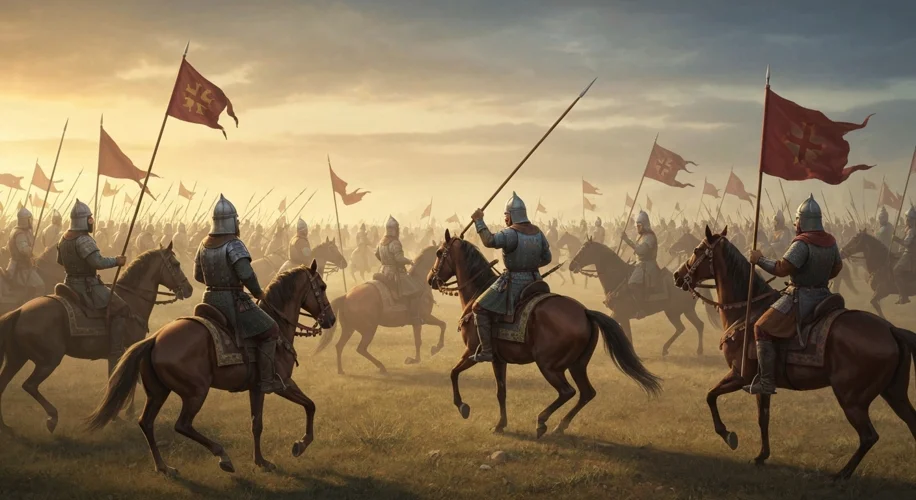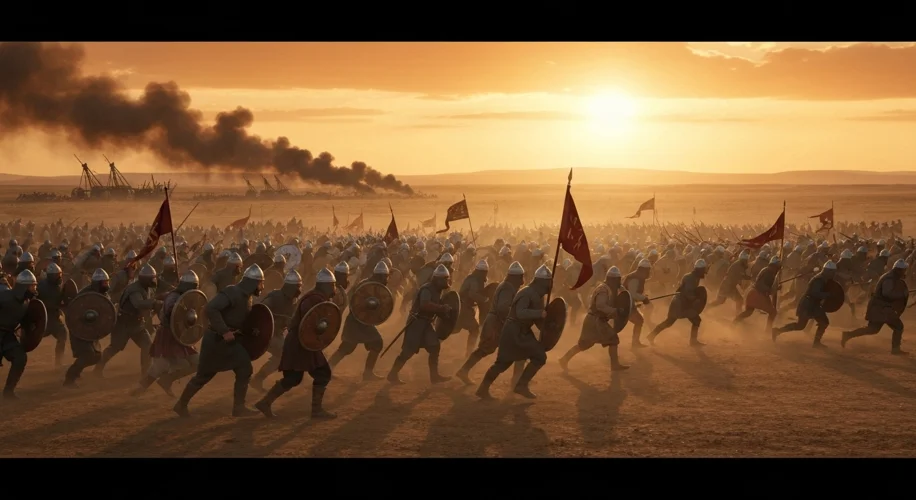Try to imagine: the sun beats down on the arid plains before Antioch, the air thick with dust and anticipation. The year is 986 AD. The Byzantine Empire, a titan of the East, stands poised for victory, its emperor Basil II, the Bulgar-Slayer, leading the charge. But this day would not bring glory; it would forge a bitter lesson in the unforgiving crucible of war.
For centuries, the Byzantine Empire had been a beacon of civilization, a successor to Rome, guarding its vast territories with a formidable military machine. Its armies were renowned for their discipline, sophisticated tactics, and the loyalty of their seasoned troops. Yet, beneath the veneer of imperial might, a subtle rot had begun to set in. The long reign of Basil I and his successors had seen a decline in the quality of military leadership. Experienced generals were a rarity, replaced by men appointed through favor or birth rather than merit. This was the insidious backdrop against which Basil II, still relatively young and eager to prove himself, launched his campaign against the powerful Hamdanid Emirate of Aleppo.
Basil II, despite his later moniker “Bulgar-Slayer” earned through brutal efficiency, was still finding his feet as emperor. In 986, he was ambitious, perhaps overly so. His objective was to reclaim Antioch, a jewel of the East that had been lost to Arab rulers centuries earlier. The army he assembled was large, impressive on paper, and filled with the hopes of the empire. However, it was critically undermined by a lack of seasoned command. The primary architect of the campaign’s strategy, a eunuch named Basil Lekapenos, was more adept at courtly intrigue than battlefield maneuvers. The overall command was entrusted to Peter Phokas, a relative of the famous general Bardas Phokas, but Peter himself lacked the strategic depth and battlefield experience necessary for such a critical undertaking.
The campaign began with initial successes, bolstering the emperor’s confidence. The Byzantine forces advanced, securing several smaller towns and seemingly on the cusp of achieving their ultimate goal: the recapture of Antioch. However, as they approached the formidable fortress of Hadath, the tide began to turn. The siege proved more arduous than anticipated. Supplies dwindled, morale wavered, and the Byzantine soldiers, accustomed to swifter victories, grew restless. It was during this prolonged and frustrating siege that the critical weaknesses in leadership began to manifest.
Instead of adapting their strategy or prudently withdrawing to regroup, the Byzantine high command made a series of catastrophic blunders. Peter Phokas, under pressure to achieve a decisive victory, ordered a rash assault on the fortress. This attack was poorly coordinated and lacked the essential elements of surprise and overwhelming force. The Hamdanid defenders, skillfully led and familiar with their defenses, repelled the assault with devastating effect. The Byzantines suffered heavy casualties, a blow from which their confidence never truly recovered.
Following this repulse, the army began its retreat. This retreat, however, degenerated into a complete rout. Harassed by the pursuing Arab forces under the command of the skilled emir, Abu al-Fawaris, the Byzantine soldiers, dispirited and disorganized, were cut to pieces. The lack of experienced officers to maintain order and rally the troops meant that the retreat became a chaotic flight. The army disintegrated, its members scattering in a desperate bid for survival. Emperor Basil II himself narrowly escaped capture, a stark personal humiliation.

The defeat at Hadath in 986 was a profound shock to the Byzantine Empire. It exposed the deep-seated issues within its military leadership and highlighted the dangers of relying on inexperienced commanders. The loss of men and materiel was significant, but the psychological impact was perhaps even greater. It dented the aura of invincibility that had long surrounded the Byzantine military.
However, this disaster served as a crucial turning point for Basil II. The personal humiliation and the evident failures of his generals ignited a fierce determination within him. He learned a harsh but invaluable lesson: that military success was not merely a matter of imperial decree but of competent leadership, rigorous training, and sound strategy. Basil II would go on to reform the army, emphasizing meritocracy in appointments and personally leading his troops with a newfound understanding of warfare’s grim realities. His subsequent campaigns, particularly against the Bulgars, would see him earn the epithet “Bulgar-Slayer,” a testament to his transformation from an inexperienced youth to a formidable military leader.
The defeat at Hadath stands as a potent reminder that even the most established empires are vulnerable when their foundations of leadership falter. It underscores the timeless truth that inexperience, when unguided by wisdom and replaced by arrogance, can lead to ruin, even at the gates of anticipated triumph. The echoes of that dusty plain in 986 AD still whisper a vital lesson to leaders across the ages: the true cost of a single, ill-fated decision.

